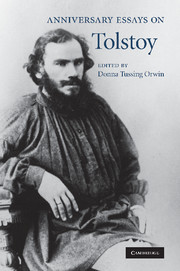Book contents
- Frontmatter
- Contents
- Acknowledgments
- List of contributors
- Introduction
- 1 Tolstoy and music
- 2 Sublime vision and self-derision: the aesthetics of death in Tolstoy
- 3 Tolstoy's peaceable kingdom
- 4 Leo Tolstoy: pacifist, patriot, and molodets
- 5 Leo Tolstoy's correspondence with Nikolai Strakhov: the dialogue on faith
- 6 The worm of doubt: Prince Andrei's death and Russian spiritual awakening of the 1860s
- 7 Tolstoy's spirituality
- 8 Tracking the English novel in Anna Karenina: who wrote the English novel that Anna reads?
- 9 Violence and the role of drama in the late Tolstoy: The Realm of Darkness
- 10 What men quote by: Tolstoy, wise sayings, and moral tales
- 11 The “proletarian lord”: Leo Tolstoy's image during the Russian revolutionary period
- Bibliography
- Index
6 - The worm of doubt: Prince Andrei's death and Russian spiritual awakening of the 1860s
Published online by Cambridge University Press: 03 May 2010
- Frontmatter
- Contents
- Acknowledgments
- List of contributors
- Introduction
- 1 Tolstoy and music
- 2 Sublime vision and self-derision: the aesthetics of death in Tolstoy
- 3 Tolstoy's peaceable kingdom
- 4 Leo Tolstoy: pacifist, patriot, and molodets
- 5 Leo Tolstoy's correspondence with Nikolai Strakhov: the dialogue on faith
- 6 The worm of doubt: Prince Andrei's death and Russian spiritual awakening of the 1860s
- 7 Tolstoy's spirituality
- 8 Tracking the English novel in Anna Karenina: who wrote the English novel that Anna reads?
- 9 Violence and the role of drama in the late Tolstoy: The Realm of Darkness
- 10 What men quote by: Tolstoy, wise sayings, and moral tales
- 11 The “proletarian lord”: Leo Tolstoy's image during the Russian revolutionary period
- Bibliography
- Index
Summary
Where has he gone? There. Where? We don't know.
G. R. Derzhavin. “On the Death of Prince Meshchersky”Hamlet. Not where he eats, but where he is eaten; a certain convocation of politic worms are e'en at him. Your worm is your only emperor for diet. We fat all creatures else to fat us, and we fat ourselves for maggots. Your fat king and your lean beggar is but variable service, two dishes, but to one table; that's the end.
William Shakespeare, HamletAfter death there might be chemical life, instead of the [kind of] physical life we have now. In my Father's house are many mansions.
Leo TolstoyIn his seminal study Tolstoy in the Sixties Boris Eikhenbaum demonstrates how the philosophical and aesthetic doctrines of War and Peace are indebted to the ideological environment of its time, particularly the debate over historical forces and the laws of history. In this chapter I connect the psychological (or more precisely, spiritualist) aspects of the novel and concurrent debates of the 1860s concerning the essence of the soul and its existence in the afterlife. These psychological dimensions of the novel are, in turn, intimately related to the historical.
The soul is the central concept of Tolstoyan psychologism, in which it is alive and active, possessing a remarkable depth while retaining the capability to reflect the sky. Mercurial and dynamic (a force), both free and subjected to necessity, it is simultaneously autonomous and conditioned by the reality that surrounds it.
- Type
- Chapter
- Information
- Anniversary Essays on Tolstoy , pp. 120 - 137Publisher: Cambridge University PressPrint publication year: 2010
- 1
- Cited by

